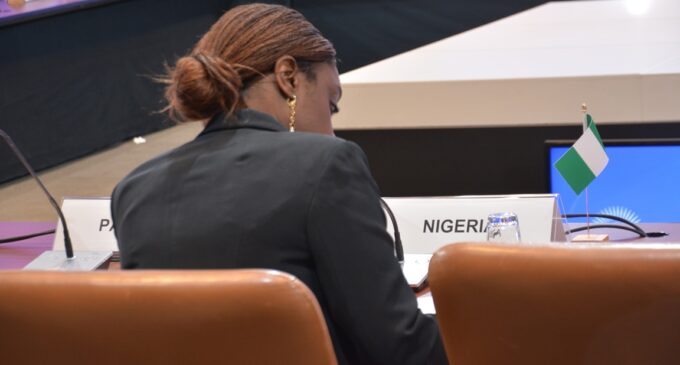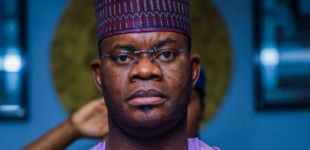12 things Kemi Adeosun did before Christmas 2016

BY GODWIN EWULU
Kemi Adeosun was appointed as the Honourable Minister of Finance just over 12 months ago, in that time, many have made her the scapegoat of all that’s ailing our great nation Nigeria. We blame her for virtually everything both personal and national. We are conscious of the fact that she is not responsible for our daily woes but who cares.
Today, we can walk into a fuel station at Christmas time and buy fuel without the traditional long and lengthy queues of Christmas’s gone by. Despite the downturn of the Nigerian economy, which by the way was not caused by Kemi Adeosun, many families continue to strive, to work and to forge ahead in whatever way they can. The National orientation is changing, albeit slowly, and people are finding new and innovating ways to make ends meet.
Without the right fundamentals, it is impossible to create the growth required to stimulate the economy. Without this stimulus, the better economy and quality of life we all seek becomes a long and arduous struggle.
Here are 12 things Kemi Adeosun has done thus far:
- Nigerians ran helter-skelter to finish this in July 2015. It was extended to August 2015, then went silent. This was an initiative commenced by the previous administration. Kemi Adeosun came in and pushed it to a finish, and now it seems the only thing close to a national ID in Nigeria right now. It is currently, the only method the banks and other institutions can use in validating the identity of their customers. She did not scrap it nor did she award a new contract for something similar. She came in and drove it to its rightful conclusion. A good finisher. Not only is it concluded, the BVN is now widely used to enhance efficiency and transparency eliminate wastage within many tiers of government at the same time, it is helping financial institutions to manage customer liabilities and a deterrent to fraud. It is protecting customers’ accounts from unauthorized access to reduce the incidence of theft and exposure to fraud.
- Another good application that was waiting by the sidelines. She came in and fully implemented it. It’s doing a great job despite being misunderstood by us all in thinking of it outside the revolving door that it is. The TSA provides a transparent system for improving the efficiency required in managing federal government revenue collections. The Federal Government can monitor and manage our revenue from revenue collecting and revenue generating agencies of government. Efficiency around collections, utilization and expenditure can now be better managed.
- IPPIS platform: The IPPIS is one of the Federal Government’s reform initiatives conceived to transform the Nigerian public service, improve the management of human resources and provide a centralized payroll system for the service. The project implementation commenced at the Bureau of Public Service Reforms before its management was transferred to the Office of the Accountant-General of the Federation in October 2008. The project went live in April 2007 with seven pilot Ministries, Departments and Agencies, and its objective include centralized payment of salaries; aiding of manpower planning and budgeting as well as facilitation of convenient staff remuneration payment with minimal wastage. The statement explained that 447 MDAs were already on the IPPIS platform, while others were expected to be enrolled before the end of this year. Yet another good software initiated well before Kemi Adeosun came into office. It did not die a natural death as was expected by the naysayers who expected it to be booted out as soon as she came in. Rather, it was made robust and used to drive the ambiguous armed forces payroll. It has lived long enough to take advantage of the accrued updates, and has become a force to be reckoned with. Another great finish.
- The Efficiency Unit Initiative: The Supervising Committee for the establishment of the Efficiency Unit was inaugurated in Abuja on Monday, November 30, 2015. This Unit is mandated to look at all aspects of government expenditure as well as revenue collection to find smart ways of improving efficient revenue collection and ensuring that government can save money while achieving more with its money. Outcomes include placing limits on government spending on meetings, travel, printing, etc. The Committee is chaired by the Finance Minister and has members drawn from both public and private sector. The Project Leader is Ms. Patience Oniha, a highly-experienced Banker and Chartered Accountant, with thirty (30) years experience in financial sector. She had worked with Ecobank Nigeria, Standard Chartered Bank, KPMG and is currently a Director in the Debt Management Office (DMO). Other members of the Committee include Head of Service of the Federation, Accountant-General of the Federation, Auditor-General of the Federation and Director, Budget Office of the Federation. Members drawn from the private sector include Mr Kabir Mohammed, former ICAN President; Mr Kunle Elebute, (Partner KPMG) and Ms. Seyi Kumapayi, Chief Financial Officer Access Bank. Members of the Supervising Committee agreed to donate their time without fee as their contribution to making government more efficient.
- Tax Reforms: Small and Medium Scale enterprises as well as budding entrepreneurs can start heaving a sigh of relief. Minister of Finance, Kemi Adeosun, said at the presentation of the recommendations of a 12-man committee set up to review the tax policies of the country. Primary among the recommendations of the committee was reduction of taxes payable by Small, Micro and Medium Enterprises (SMMEs) in the country. The rationale for this recommendation is to encourage more entrepreneurs to startup businesses as well as boost profitability of existing ones, which will eventually result in increased Gross Domestic Product (GDP). Businesses operating above the radar can take advantage of the formal sectors without fear of over taxation.
- Customs Software: The Federal Government has initiated plans to use technology as an enabler to fight smuggling and increase revenue collections. Adeosun said: “Going forward, we are introducing a new system where all vehicles will be registered using the Vehicle Identification Number effective 31st March, 2017. Customs clearance will be linked to the VIN and this in turn will be required by each State Government at the point of vehicle registration. Effectively, any vehicle on which duty has not been paid will not be able to be registered and driven in Nigeria.
- Development Bank of Nigeria Initiative: Development Bank of Nigeria set to take-off: The Federal Government has reached agreement with the World Bank Group and other development partners for the release of $1.3 billion for the take-off for the Development Bank of Nigeria. Adeosun re-empasised that creating the Development Bank of Nigeria was not a duplication of duty of any organisation, especially the Bank of Industry, because it was targeted at Small and Medium Enterprises.
- Diaspora Assistance: The Minister of Finance, Mrs. Kemi Adeosun called for a review of mode of donations from Nigerians in the Diaspora, noting that some of the donations had become avenues for abuse with the attendant revenue leakages. She stated that presenting consumer items as medical donations had created windows for the importation of expired drugs as well as drugs that are intended for resale.
- Financial Sustainability Plan: A contract between The States and The Federal Government to promote, transparency, accountability, efficiency and assist the states to stimulate local economies to grow the GDP at the state level. This is an opportunity to encourage as many states as possible to become self-sufficient and stimulate commercial activities within the states. Many of the initiatives successfully applied at the federal level are being cascaded through the states and many states are already reaping rewards as they take ownership, through public private partnerships, in agriculture, mining and some industries.
- FHF: The “Family Home Fund”, N500 billion over five years has been earmarked to finance affordable houses for Nigerians, starting with the construction of 100,000 houses annually from 2017. The housing fund is expected to increase from N500 billion to N1 trillion of government stimulus to make it possible for the private sector, to deliver about 400,000 houses annually through developer finance and mortgages through Mortgage Banks. These mortgages will be available from a single digit interest rate of 9.99% with tenures of up to 20 years. New homeowners can make their initial deposit from 10 per cent. The low and middle-income earners would benefit more from the scheme as most the homes would be sold between N2.5 million and N7.5 million depending on the type and location.
- Looted funds: The federal government has begun tracing Nigerian funds that were illegally moved out of the country to foreign nations with the aim of recovering and repatriating them. Reportedly, the funds were traced to the United States, the United Kingdom, France, Switzerland and other European countries where corrupt officials allegedly have been stashing public funds. The Minister of Finance clarified that the amount payable to Nigeria from Switzerland is $321 million, and is being returned to Nigeria for projects which are subject to verification by the World Bank. The recovery process is ongoing with the Swiss authorities and the World Bank has agreed to undertake the required verification.
- Whistleblower: Her Latest Initiative. The minister has launched the whistle-blower programme designed to encourage anyone with information about the stealing of public funds to report it. According to her, the type of information that can be reported include mismanagement or misappropriation of public funds and assets (e.g. properties and vehicles), financial malpractice or fraud. She listed some of the financial malpractices as “collecting/soliciting bribes, corruption, diversion of revenues, fraudulent and unapproved payments, splitting of contracts and procurement fraud (kickbacks and over-invoicing etc). The benefits of the programme, she said, include: increasing the exposure of financial or financial-related crimes; supporting the fight against financial crimes and corruption; improving the level of public confidence in public entities; enhancing transparency and accountability in the management of public funds; improving Nigeria’s open government ranking and ease of doing business indicators, and the recovery of public funds that can be deployed to finance Nigeria’s infrastructure deficit. The Minister defined a whistleblower as any person who voluntarily discloses information in good faith about a possible misconduct or violation that has occurred, is ongoing, or is about to occur
Invariable, the green shoots of recovery are abounding as the seeds being planted by these types of initiatives, plus many others, start to take root. Economic recovery, is not a magic wand or a magic trick. It must be based on activities designed stimulate growth. Growth cannot be sustainable without sound policies initiatives and structures being put in place by Government.
Ewulu can be reached via [email protected]
















There are no comments at the moment, do you want to add one?
Write a comment